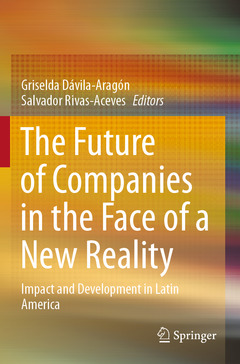The Future of Companies in the Face of a New Reality, 1st ed. 2021 Impact and Development in Latin America
Coordonnateurs : Dávila-Aragón Griselda, Rivas-Aceves Salvador

Analyzes Mexican economic agents’ reactions to the changes brought on by the COVID-19 pandemic
Measures impacts on economic activities from theoretical and empirical perspectives
Measures the pandemic's impact on inequality and poverty by modelling economic growth in Argentina, Colombia, Ecuador, Mexico, and Peru
Date de parution : 07-2022
Ouvrage de 201 p.
15.5x23.5 cm
Disponible chez l'éditeur (délai d'approvisionnement : 15 jours).
Prix indicatif 168,79 €
Ajouter au panierDate de parution : 07-2021
Ouvrage de 201 p.
15.5x23.5 cm
Disponible chez l'éditeur (délai d'approvisionnement : 15 jours).
Prix indicatif 168,79 €
Ajouter au panierThèmes de The Future of Companies in the Face of a New Reality :
Mots-clés :
Business operations in the New Normal; Economic and Business Impact of the COVID-19 Pandemic; CSR in Crisis Management; Innovations in Business in the New Normal; Impact of COVID-19 on economic activities in Mexico; Impact of COVID-19 on medical tourism; Impact of COVID-19 on the coffee industry; Impact of COVID-19 on economic activities in South America



